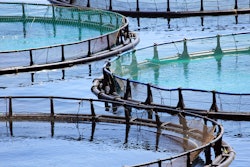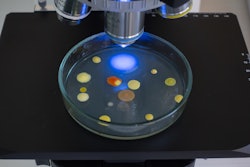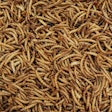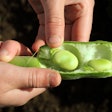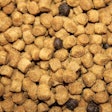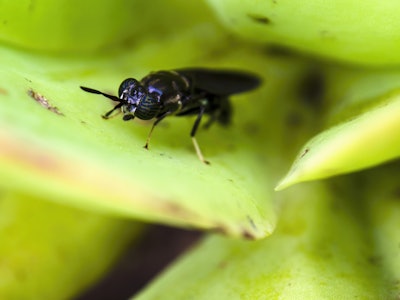
Bangkok-based insect breeding startup Full Circle Biotechnology believes it has solved a key problem for insect meal as a feed ingredient with the invention of an automated insect rearing and processing technology it calls the Black Box.
The technology combines solid state fermentation and black soldier fly production in a proprietary, automated process that intakes agricultural waste and byproducts as a substrate and turns out a low-cost protein product on the other end. The cost of this protein, according to Full Circle Biotechnology founder Felix Collins, can already undercut fish meal in most circumstances. In trials where Full Circle Biotechnology has partnered with companies capable of providing their own substrate, the cost of the protein can beat soy, Collins said.
The company has an 8-ton demonstration plant up and running, but it believes it could produce up to 500 tons of protein per month in about 1,500 square meters. An initial feeding trial with white shrimp posted good results. Interest in the product, Collins said, is soaring.
“This production system … allows us to make a lot more protein with a lot less input, and so we can price pretty affordably,” he said. “So, the demand we have is really quite extraordinary, to be honest.”
Full Circle Biotechnology expects it could have 12 full-scale Black Box systems in operation by 2026 if all goes well.
Collins initially began his work with black soldier flies with another company in 2017. The initial plan was to trade black soldier fly meal, he said, but it had to go into production itself in order to meet demand.
Like others in the novel protein space, Collins noted that conventional means of rearing black soldier flies were inefficient and costly. COVID-19 slowed international trade and gave Collins more time to think on the problem, and he conceived the idea of mixing insects and microbes in an automated system in 2020.
The company is still working to engineer the Black Box system to reduce construction costs and ensure it can be built swiftly, while also running additional feeding trials — particularly in swine, where several the company’s partners have expressed an interest, Collins said.
“We’re trying to do everything as properly as we can and engineer as diligently as we can right now because we believe that will enable us to have that exponential growth” that many of the company’s partners hope to see, he said.



